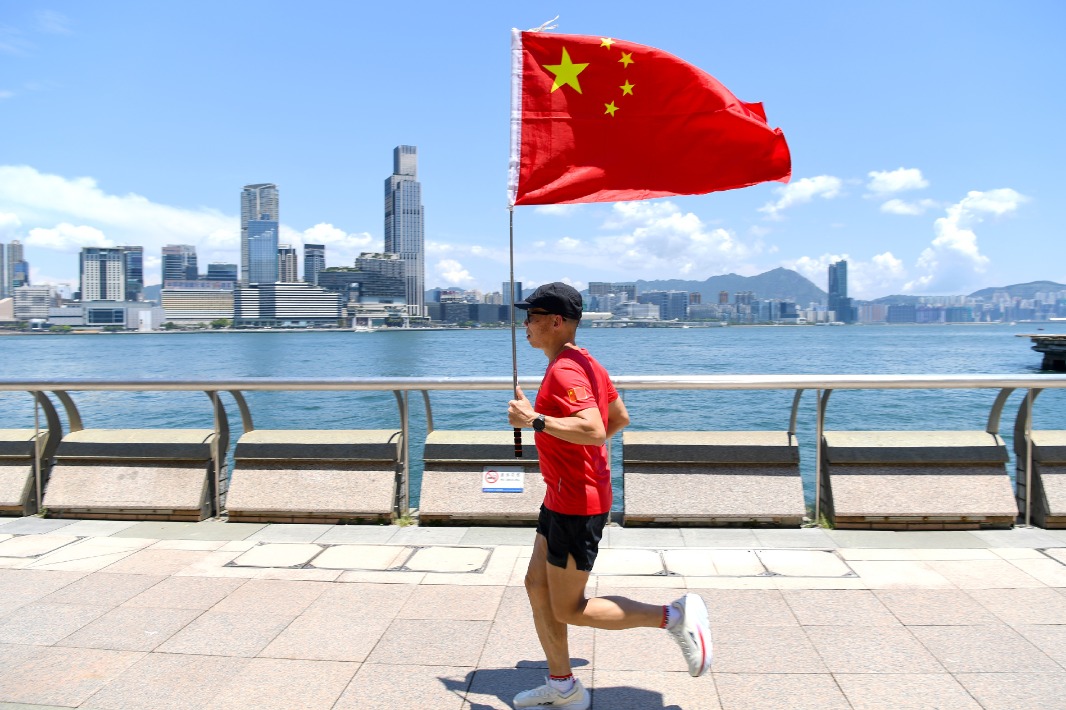Powering the hydrogen economy

Hong Kong is striving to develop renewable energy sources to reduce its carbon footprint, with hydrogen poised to play a significant role in combating climate change and creating a clean, green economy. Oswald Chan reports from Hong Kong.

Editor's note: Hong Kong will spend HK$240 billion on various measures in the next 15 to 20 years to tackle climate change in a bid to achieve carbon neutrality by 2050. In this series, we examine how green buildings, green transport and hydrogen fuel will help the city realize its goal while shaping a decarbonization value chain that is expected to diversify the local economy.
Electricity generation is the largest contributor to carbon emissions in Hong Kong, accounting for 66 percent of the total carbon emissions in 2019, according to the city's Climate Action Plan 2050.
The special administrative region has been relying on imported fuel for generating power, or electricity imported from the Chinese mainland, to meet its electricity demand. With various initiatives to drive the development of renewable energy, Hong Kong's fuel mix for electricity generation has changed.
In 2015, coal accounted for 48 percent of electricity generation, but the ratio dropped to 24 percent in 2020. In the same period, the ratio of natural gas in the fuel mix ballooned from 27 percent to 48 percent. Nuclear and renewable energy's contribution had also risen, although slightly - from 25 percent to 28 percent - between 2015 and 2020, according to the Climate Action Plan 2050.
The HKSAR government expects renewable energy's share in the fuel mix for generating power to increase from less than 1 percent at present to between 7.5 percent and 10 percent by 2035, and jump to 15 percent subsequently.
Zero-carbon energy, or renewable energy, refers to energy sources that generate little or no carbon emissions during their production or use. Such sources can be solar, wind or hydrogen.
Hong Kong is developing renewable energy sources on all fronts. The government will strive to develop more advanced waste-to-energy facilities to generate electricity. It is also reviewing proposals with the city's two power companies to develop offshore wind farms, and has encouraged the community to develop solar energy.
Waste accounted for 7 percent of the city's total carbon emissions in 2019, according to Climate Action Plan 2050. Developing waste-to-energy facilities and promoting waste reduction recycling will mean shifting away from reliance on landfills for municipal waste disposal that leads to a high carbon footprint.
Hong Kong's drive to develop large-scale renewable energy still faces constraints due to geographical factors, scarce land resources, and densely populated areas.
Among the zero-carbon energy sources, hydrogen is set to play a more significant role in efforts to combat climate change.
Hydrogen is a versatile, nontoxic and lightweight gas that can be stored, transported and converted into clean power. More importantly, it has the potential to decarbonize a wide range of sectors. A clean-green economy can be developed when hydrogen can feed into a range of applications, such as chemicals, transport, buildings or manufacturing, if produced on a large scale.
Grey hydrogen (not carbon-free), which is the most common form, is generated via carbon-intensive methods, using a natural gas or coal feedstock; while green hydrogen (carbon-free) is produced from sustainable power sources via methods such as electrolysis - a chemical reaction that breaks water down into its constituent parts, hydrogen and oxygen. Renewable power sources, such as solar or wind, can be applied to generate green hydrogen.
The Hydrogen Council - an international advisory body to foster long-term clean energy transition - expects global hydrogen demand to reach 546 million metric tons by 2050, up from the current 70 million metric tons, with a 6.4-percent annual growth rate.
Viable alternative
Among various business sectors, hydrogen offers a viable alternative to battery-powered electric vehicles. The power sources being used in Hong Kong transport vehicles are still heavily reliant on gasoline, diesel and electricity.
Under Climate Action Plan 2050, the SAR government pledged to cut total carbon emissions by 26 percent to 36 percent by 2030 when set against the 2005 baseline. In 2020, carbon emissions were about 20 percent lower than those in 2005.
Lawrence Cheung Chi-chong, chief innovation officer at the Hong Kong Productivity Council, says Hong Kong should think more about how to develop the application of hydrogen fuel cells in public transport when hydrogen fuel cell technology can cut greenhouse gas emissions as the technology emits only water. "There is potential for public transport vehicles, such as buses and taxis, to adopt the hydrogen-enabled mode, while private cars and commercial vehicles like trucks and vans are more likely to adopt the battery-powered model," he says.
For battery-powered electric commercial vehicles, like buses and taxis, the charging time is usually around midnight when their daily operations end, and charging facilities are needed provided there is adequate land, Cheung explains. "For Hong Kong's estimated 7,000 franchised public buses and 18,000 taxis in service, it is not viable and sustainable to find adequate space and facilities that can provide electric charging for these vehicles overnight."
Unlike the charging of electric-vehicle batteries that takes more time, the hydrogen refilling process can be completed in a few minutes. Most of the liquefied petroleum gas refilling stations can be upgraded into hydrogen refilling stations easily.
As the time for using private cars and commercial vehicles is not standardized, it is easier for owners of these vehicles to use electric charging, says Cheung, while the time for refilling hydrogen for buses and taxis is similar to that for refilling gasoline-powered buses and taxis.
Bravo Transport Holdings, owner of Hong Kong's bus operators Citybus and New World First Bus, launched Hong Kong's first hydrogen fuel cell double-decker bus in July - two months after it introduced the city's first electric double-decker bus service. While the bus is Hong Kong's first-ever hydrogen fuel cell vehicle, it is also the world's first tri-axle hydrogen fuel cell double-decker bus.

The bus will enter service after it has passed the inspection and testing processes and the relevant laws and regulations are updated. The vehicle is equipped with the fuel cell that converts hydrogen into electricity to power the bus and its entire system. It is able to cope with the local operating environment, including high passenger loads, steep road gradients, long service time and operating mileage, as well as constituent use of air-conditioning systems.
"The business value chain generated by the adoption of hydrogen energy in green transport will involve research and development, production, transportation, storage, refilling and electricity generation. It will also involve different expertise that will create more types of jobs," says Steven Chan Nai-kin, president of the Hong Kong Fuel Cell and Hydrogen Energy Association.
Hydrogen-fueled cars require maintenance and repairs that differ from those of electric battery-run cars. They require expertise in electrical, power and chemical engineering as hydrogen-filling stations need the expertise for protecting the storage tank and power transmission of hydrogen to prevent leakages.
But the SAR government is rather passive in encouraging hydrogen to be used as another energy source, says Chan. "The government is dragging its feet and waiting for breakthroughs in hydrogen generation technology. It does not proactively deal with issues associated with transportation and the storage of hydrogen energy."
Collaboration, supports needed
Cheung notes that Hong Kong has little expertise in hydrogen fuel cars. Thus, the city should cooperate with mainland automakers in producing hydrogen fuel cell cars. "Mainland automakers have manufacturing plants in the Guangdong-Hong Kong-Macao Greater Bay Area. Hong Kong can contribute to and support research and development so that mainland automakers can leverage their production capabilities to produce hydrogen fuel cell cars that are suitable for use in Hong Kong," he says.
"The HKPC can provide technical consultancy services to industrialists to choose potential partners in developing hydrogen fuel cell cars. If industry stakeholders need the technology to be localized to suit Hong Kong's specific conditions, we can link up startups and product suppliers in Hong Kong," Cheung adds.
"Led by Foshan, a fuel cell vehicle demonstration city cluster has been established in Guangdong province. Hong Kong should learn from Guangdong's experience in developing the hydrogen energy industry and strengthen cooperation with industry leaders in the Greater Bay Area so as to get support in hydrogen energy supply, equipment and vehicle manufacturing," says Yang Dong, CEO of Hong Kong-based Hans Energy Co, which is transforming its business to building a hydrogen energy supply chain in Hong Kong.
Derek Man Lee-yeung, honorary treasurer of the Hong Kong Fuel Cell and Hydrogen Energy Association, says the SAR government, private enterprises and industry players should jointly promote the hydrogen economy. But, as private companies' main goal is to make profits, they may not take the initiative to push for research and development of hydrogen energy, he says, adding that industry players may have the expertise to accelerate R&D development, but lack financial resources.
Man urges the SAR government to take a leading role in the field. By providing funding, the administration can work with large private companies in conducting R&D in hydrogen energy and creating hydrogen-related technology prototype products. More financial incentives would speed up the technology commercialization process.
"The government can also issue guidelines to educate stakeholders on how to apply, transport and store hydrogen safely. It should also consider hydrogen transportation and storage in future town planning," he says.
Apart from financial and policy supports, the government should consider setting up a task force with its own testing laboratories for conducting R&D on hydrogen energy. By recruiting industry players, academics and government engineers, these laboratories can help expedite the development of hydrogen energy, says Man.
Yang wants the government to introduce standards and regulations for hydrogen energy as soon as possible. "Greater efforts should be made to eliminate public concerns about the safety of hydrogen energy and help the public understand the significance of hydrogen energy in environmental protection; policies concerning hydrogen fuel vehicles and infrastructure construction should be enhanced; and financial support should be provided," he says.
According to Yang, the SAR should introduce international advanced technologies, concepts and standards to build a world-class hydrogen energy supply chain that is "made in Hong Kong". Another plan is for the government to consider using power generated by its "waste-to-energy" projects to electrolyze water to produce hydrogen for solving the problem of waste disposal, as well as other matters involving hydrogen supply in Hong Kong.
The "bus-plus-property development" model can also be considered to propel the development of hydrogen-fuelled public transport in Hong Kong, Yang suggests. If the government can grant bus companies property development rights, like the MTR Corporation enjoys, bus companies can then use part of the profits from real-estate development to buy hydrogen-fuel buses, build related infrastructure and subsidize operations, he says.





































